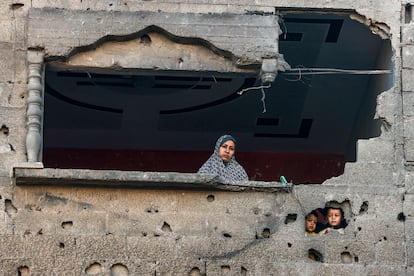When does compassion expire?
We told ourselves that we would not fall into the indifference of all those other times until one day, with the slip of a finger, we suddenly stop looking into the eyes of terror and focus on the next video that jumps out at us: it is more pleasant, without so much death

We no longer look, we find the pain exhausting and unbearable. Maintaining an unwavering gaze, such a simple act, becomes such a difficult thing to do. We told ourselves that we would not fall into the indifference of all those other times until one day, with the slip of a finger, we suddenly stop looking into the eyes of terror and focus on the next video that jumps out at us: it is more pleasant, without so much death. That video leads us to another one and another one and in the end, it is impossible to remember what the first one was about, because the algorithm knows what it is doing. Attention is the new drug.
We told ourselves that, since we can hardly do anything against the war — maybe a few tweets, maybe a few articles, as ridiculous as that is — we would at least commit to keeping up our interest in the matter, which is the most human and the most basic thing to do: looking and wanting to know. But looking is no longer possible, because dead, orphaned and injured children continue to show up under the rubble. And there comes a time when, without knowing why, you swipe and look away. In reality, we do know why: because we can, because the reality of others is just an image to us. And if it is not seen, it does not exist.
Audience ratings have taught us the difference between what we say we watch and what we really watch. They have taught us that news programs cannot broadcast very harsh images for a long time, because that pain ends up anesthetizing or tiring viewers, as if our capacity to be moved, or to be outraged, had a limit, which perhaps it does: the question is how long that is. A couple of days? Three? One week?
The other day I saw how a child arrived at the hospital after one of the bombings and in the image, which was taken from afar, there was also a man recording with his phone. He ran just like the paramedics, close to them, and brought his cell phone as close to the scene as he could. He then continued recording, with a frightening coolness, as soon as more children began to be brought in with open wounds. That man was recording so he could show the world. For the record. That man recorded it because he couldn’t do anything else. He will never know how many people will watch his videos or how many, watching them, will wonder how this all ends and if anything can be done. One can, at least, want to look in order to know. Everything else remains a mystery: it is a mystery when empathy and solidarity expire. Or compassion, so often mentioned now during Christmas.
Sign up for our weekly newsletter to get more English-language news coverage from EL PAÍS USA Edition
Tu suscripción se está usando en otro dispositivo
¿Quieres añadir otro usuario a tu suscripción?
Si continúas leyendo en este dispositivo, no se podrá leer en el otro.
FlechaTu suscripción se está usando en otro dispositivo y solo puedes acceder a EL PAÍS desde un dispositivo a la vez.
Si quieres compartir tu cuenta, cambia tu suscripción a la modalidad Premium, así podrás añadir otro usuario. Cada uno accederá con su propia cuenta de email, lo que os permitirá personalizar vuestra experiencia en EL PAÍS.
¿Tienes una suscripción de empresa? Accede aquí para contratar más cuentas.
En el caso de no saber quién está usando tu cuenta, te recomendamos cambiar tu contraseña aquí.
Si decides continuar compartiendo tu cuenta, este mensaje se mostrará en tu dispositivo y en el de la otra persona que está usando tu cuenta de forma indefinida, afectando a tu experiencia de lectura. Puedes consultar aquí los términos y condiciones de la suscripción digital.









































